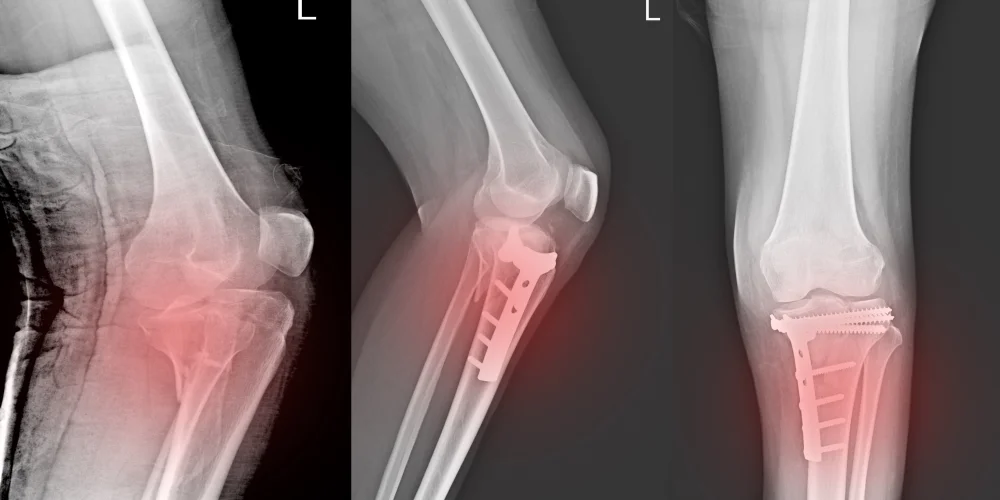Fracture Repair Surgery
Expert Fracture Repair to Ensure Quick Healing and Optimal Recovery
Fracture repair is a vital procedure that is designed to treat broken bones in order to help them are healed properly and recover the strength and function. In Chirayu Super Speciality Hospital, our orthopedic surgeons are proficient in performing a variety of repair procedures for fractures making use of cutting-edge techniques and advanced technology. If you’ve suffered an injury that is minor or a complicated fracture, our goal is to offer a dependable treatments that speed healing, eases pain and helps you move around freely.

What is Fracture Repair Surgery?
The procedure of repair for fractures involves surgery to align and stabilize damaged bones. This procedure is required in cases of severe fractures dislocated, or displaced, or when other methods like splinting or casting not enough. During the surgery, metallic rods, plates, screws or pins can be utilized to help keep bone fragments in their right position while they heal. The technique chosen will depend on the area and severity of the fracture in addition to the health of the patient and requirements.
Who Performs Your Surgery?
In Chirayu Super Speciality Hospital, surgery for repairing fractures is performed by highly skilled orthopedic surgeons that specialize in the treatment of bone injuries. Our surgical team has been trained in both conventional and minimally invasive methods that ensure precise alignment of bones and the best results. This team of orthopedic specialists is dedicated to providing caring and individualized treatment plans that are that are tailored to the individual patient’s medical condition.
Types of Fracture Repair Surgery
- Open Reduction and Internal Fixation (ORIF) : This technique involves making an incision to realign the fractured bone fragments and securing them with metal hardware such as plates, screws, or rods.
- Closed Reduction and Internal Fixation : A less invasive procedure where bones are realigned without an incision, followed by the insertion of pins, rods, or screws to stabilize the fracture.
- External Fixation : Metal pins or screws are placed into the bone on either side of the fracture, and a metal frame is attached outside the skin to hold the bones in place.
- Intramedullary Nailing : A rod is inserted into the hollow center of the bone, providing internal support to fractures of long bones like the femur or tibia.
Symptoms Indicating Need for Fracture Repair
The signs that indicate the need for repair procedures include extreme discomfort at the site of injury and visible bone deformity swelling, bruising and inability to maneuver the injured region or bone protruding from the skin (open fracture). It is imperative to seek immediate medical attention in the case of fractures that are that are accompanied by these signs to avoid complications and assure the proper healing.
Diagnosis for Fracture Repair Surgery
The diagnosis is made after an extensive physical examination as well as review of the medical background. Imaging studies like the X-rays CT scans and MRI scans are essential to determine the severity and severity of fracture. These diagnostic tools aid in determining the most appropriate surgical method and the best plan for successful repairs to fractures.
Treatment Process
The procedure for repairing fractures typically begins with anesthesia in order to ensure the patient’s safety. The surgeon will then make an incision (if required) to access the fractured bones and realign them in a precise manner. Metal hardware, like rods, plates, screws or pins, are employed to keep the bones together during healing. The method of fixing is dependent on the location of the fracture and the severity. After the bones are stable and the fracture is stabilized, the incision is then closed and the fracture is then covered in. The procedure can be completed in a couple of hours according to the extent of the injury.
Care and Recovery After Surgery
The recovery process following surgery to repair a fracture is a mixture with rest and immobilization and gradual return to activity. Treatment for pain is done with prescription medication, while physical therapy is usually suggested to regain strength, mobility, as well as functionality. The time to recover varies based on the kind and location of the fracture the majority of patients return to routine activities within a few weeks to a couple of months. Regular follow-up visits are crucial to assess the healing process.
Advantages of Choosing Our Surgery Services
Expert Trauma Surgeons
Skilled in handling all types of fractures with precision and care.
Advanced Fixation Techniques
Use of the latest surgical tools and techniques for stable and effective bone healing.
Personalized Recovery Plans
Individualized rehabilitation programs to promote rapid healing and regain function.
What Our Patients Say
Read about our patients positive experiences and how Chirayu Super Speciality Hospital has positively impacted their health and well-being.


The surgical team at Chirayu performed my fracture repair with precision. My recovery has been outstanding, and I’m back to normal activities.


After my ankle fracture repair, I’m back to walking without pain. The surgical team at Chirayu was fantastic!


The orthopedic team at Chirayu took great care of my broken arm. Their expertise and attention to detail were remarkable.


The fracture repair surgery I received at Chirayu was quick and effective. I’m healing well and back to my daily routine.
Meet Our Medical Specialists
Our experienced orthopedic surgeons specialize in fracture repair, using advanced techniques to ensure precise treatment and fast recovery.
Frequently Asked Questions
Here, we provide answers to some of the most commonly asked questions to help you better understand about our surgery services. If you have any additional questions, please do not hesitate to contact us.
Risks may include infection, blood clots, bleeding, nerve damage, and complications related to anesthesia.
It is needed for severe, displaced, or complex fractures that cannot be treated effectively with casting or splinting alone.
Fracture repair surgery is a procedure to realign and stabilize broken bones using metal plates, screws, rods, or pins.
Surgery duration varies based on the fracture’s complexity but typically ranges from one to several hours.
The procedure involves realigning the bones and securing them with metal hardware to ensure proper healing and stability.



